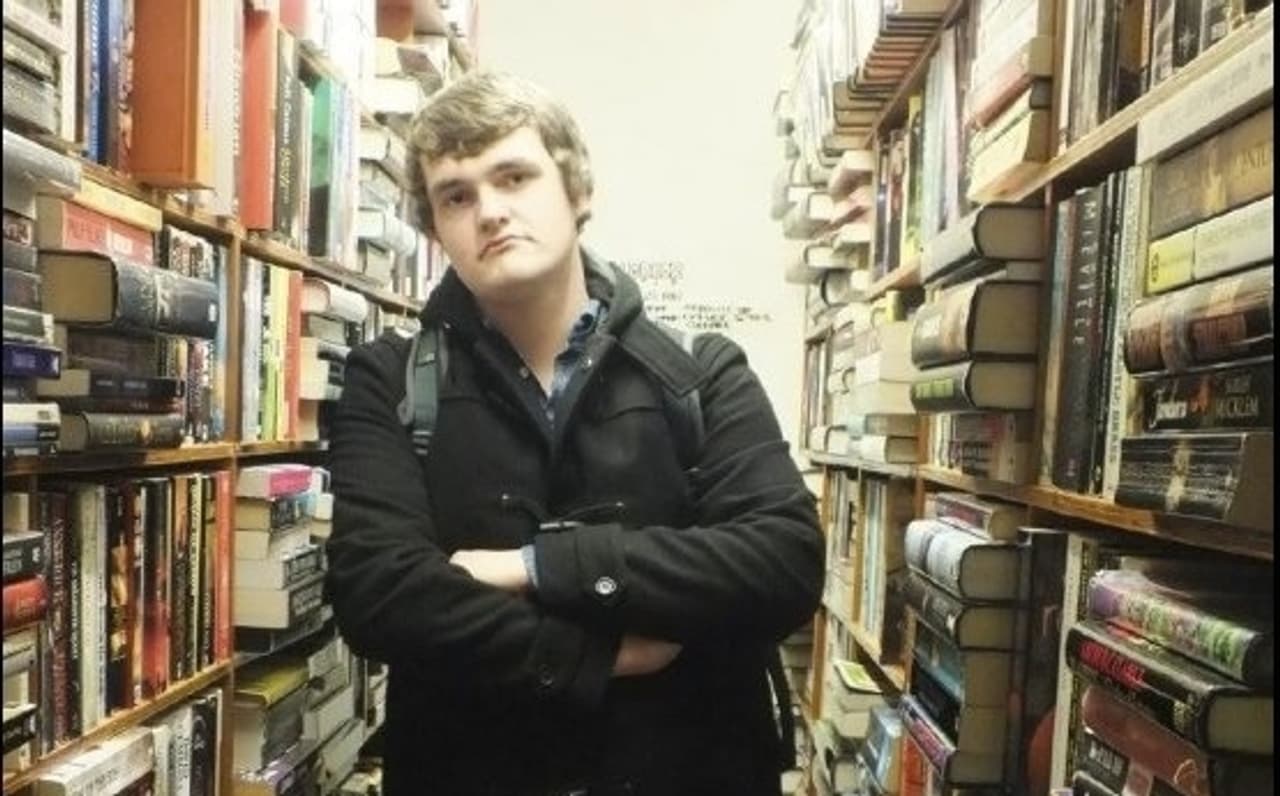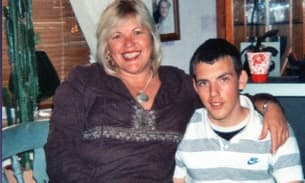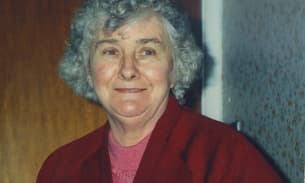
Suicide note of young gay man called supported housing a ‘torture chamber’
The family of a young gay man who killed himself while living in supported housing was not consulted during a council review into his death, or even told it was taking place, the Bureau of Investigative Journalism can reveal.
Jack Ellis, who had autism and diabetes, hoped he would be helped and protected when he moved into a Curo social housing project in Weston-super-Mare in September 2013 following bullying by some of his peers and multiple suicide attempts. The unit is specifically for vulnerable people, especially those with mental health issues, and provides each resident with a key worker to support them.
But he was harassed and intimidated inside the accommodation, according to a suicide note in which he described Curo as one of several “torture chambers” he had to endure. He successfully killed himself in March 2014, with his body lying undiscovered in his room for days.
Jack’s family believes he was failed by Curo, a major social housing provider in southwest England. They hoped the tragedy might at least lead to lessons being learnt.
But today, the Bureau of Investigative Journalism can reveal that:
- No one from Curo was asked to give evidence at the inquest into Jack’s death.
- According to current and former Curo board members his suicide was never discussed at board level.
- Jack’s suicide note specifically cited harassment inside his accommodation as one of the motivations for his suicide attempt.
- North Somerset Council did not take any evidence from Jack’s relatives during a review of his case or give them a copy of the findings.
- Jack also attempted suicide two months after moving into the supported housing, but according to his family no staff members were on duty at the time, meaning another resident had to take him to hospital.
We can also reveal that Curo’s chairman resigned last May following a major dispute with the chief executive who had accused him of getting too involved in tenants’ grievances.
Jack’s sister Rebecca Weeks says the family feels it was utterly let down by Curo. “We were told Jack was going to a safe, secure place but the hostel was none of those things,” she said. “Curo should not have accepted him knowing that he was so vulnerable and the security was so lax there.”
Rebecca rebuked North Somerset Council for failing to involve her and her mother in its review. “To understand the difficulties Jack was facing they needed to speak to the people who knew him best – his family,” she said. “There has been no transparency with his relatives which makes me wonder what the council are hiding. If there’s nothing to hide, why the cloak and dagger approach?”
She called on the council to release details of the review as soon as possible. “After all this time, I would like to know what the findings were.”
Safe and supportive
Jack, a vulnerable 19-year-old student, went to live at Curo’s supported housing project in Wadham Street, Weston-super-Mare in September 2013 following a suicide attempt at his home. It was at least the second time he had attempted to take his own life.
Curo is a social housing provider which manages almost 13,000 properties in the south west of England. It also offers support services and housing to the homeless, elderly people, young people and people with mental health issues.
Jack’s sister accompanied him to his first meeting with Curo, and was reassured that her brother would be moving into a safe, supportive environment: “We were told there would be someone on the premises 24 hours a day and that there were cameras outside all the bedrooms,” she said.
Curo is currently paid £142 per week in housing benefit for each tenant at the Wadham Street project, which together with a nearby site comprises 17 “studio flats” with shared kitchen and lounge facilities.
The £142 weekly payment is more than twice the £67.30 maximum offered in housing benefit for ordinary private accommodation, and covers the costs of security at the property and key workers to support the tenants.
Jack was happy in his new home at first, but that changed when it became clear that older adults had free access to the premises, said Rebecca.

Her brother claimed some of those adults would take drugs with the younger residents. “One was trying to get Jack to have sex with his girlfriend so that he wouldn’t be gay any more,” she said. “It was a free for all.”
Rebecca told the Bureau she learned the accommodation was only staffed Monday to Friday, and the Curo employees working at Wadham Street also covered a second supported hostel in the town.
Jack was also being bullied by fellow students at the local college, compounding his unhappiness. In November 2013 he was assaulted in Weston. In the same month, Rebecca said, he was threatened with stabbing inside the premises by a man who did not live there, but had gained access via one of the other residents.
After the incident, Jack made another attempt to take his own life, but was saved by another tenant, who took him to hospital.
“The hospital rang me up,” Rebecca said. “Curo didn’t tell me. There was no one on duty at Wadham Street at the time – the staff had left at 5pm.” The Bureau put this claim to Curo but it did not respond.
Knocked unconscious
A few weeks later in January 2014, a former friend who was bullying him over his sexuality knocked Jack unconscious on the street. Not long after that, Rebecca said, a second youth attempted to break into his room.
“When I arrived the police were in the building speaking to the youth in question but no-one was arrested,” Rebecca said. There were no staff members there, she added.
Jack killed himself in early March 2014, aged 20. His body lay undiscovered for several days before being found by his mother in a state of decomposition.
I cannot bear to live in a place that is filled with the smell of weed, the sound of sex, the noise
– Jack Ellis’ suicide note
In a suicide note shown to the Bureau by his family, Jack lists seven motivations for his multiple attempts to take his life. Two of them refer specifically to his experience inside the hostel, which he described as one of several “torture chambers” he had to endure.
“I cannot bear to live in a place that is filled with the smell of weed, the sound of sex, the noise. The place where my cupboards have been destroyed, my cutlery and food lost and stolen,” he wrote. “I was being tormented by [another resident], who would make strange noises every time she saw me and she reported me to Curo on the unlikely premise that “I was smoking weed in my room”.”
An inquest in September that year found that he had probably killed himself by taking an overdose of his medication. The coroner did not ask to hear evidence from the Curo support worker who looked after Jack, or anyone else from the organisation.
When asked why, senior coroner for Avon Maria Voisin told the Bureau she was unable to comment in-depth because the inquest had been completed and she had given her conclusion. However she said via a spokeswoman that “there was sufficient evidence to conclude the inquest without referring to the supported accommodation.”
Jack’s mother, Helen Ellis said she called Curo some time after her son’s death to find out if there was going to be an internal investigation, and spoke to the service manager for temporary accommodation. “He didn’t know anything,” she said. He promised to get back to her when he had looked into it, she added, but that was over a year ago.
The Bureau understands that the Curo board did not formally discuss Jack’s suicide.
“I did not hear about the suicide at Wadham Street until long after it happened, and then only informally,” one former board member said. “It was never discussed at board level.”
A current board member said their knowledge of the case was confined to press reports following the inquest.
‘Shocked and saddened’
An audit of Curo’s supported accommodation by external consultants carried out in 2015 gave the housing association’s four projects in Weston an “adequate” or “good” rating for the support and security provided, which it said was “an excellent outcome.”
However there were no formal information-sharing protocols in place relating to safeguarding incidents and there was insufficient evidence that consultation on policies had led to “any real improvements in practice”.
At temporary accommodation projects in Bath and Weston, including Wadham Street, there was “limited internal quality monitoring by the manager”. Health and safety records also needed to be better organised at the Weston sites, it said.
Curo’s 2014-2015 annual review found that 79% of its customers were happy with the overall service the organisation provided and 88% of 774 complaints received over the course of the year had been resolved at first stage.
The Bureau asked Curo to respond to Jack’s family’s criticisms of his care. The acting chairman of Curo’s board, Dermot Courtier, said: “We were shocked and saddened by the death of Mr Ellis at our property in March 2014, and expressed our sincere sympathy to his family at that time. He was a person with complex needs and as his landlord we worked closely with the many agencies involved in supporting him.”
He added: “We constantly monitor and update our safeguarding systems, and an independent review of our services in 2014 found them to be ‘consistently high’.”
No ‘warning signs’
A spokeswoman for North Somerset Council said the county’s adult safeguarding board had carried out a “full review” of Jack’s case with representatives from “all the key agencies” involved in his care, which included Curo. But she admitted the review had not included any evidence from Jack’s relatives, and the findings were not shared with them.
“The review considered the multi-agency procedures and actions taken regarding Jack’s case,” said the spokeswoman. “It therefore did not include information from the family.”
The review found that “Communications between these agencies was good and we saw no ‘missed opportunities’ or ‘warning signs’ in the weeks before he took his own life’.”

The council spokeswoman continued: “The review also recommended several procedural improvements be made by all agencies involved in Jack’s case. Since the initial review two subsequent lessons learnt reviews have been held to ensure these improvements have been put in place.”
The council said it “would not be appropriate to share the review” with the Bureau and did not respond to requests for details of the recommended improvements.
Jack’s sister Rebecca was not aware the review had taken place. “I was not invited to any meeting, nor have I received any information regarding a review,” she said.
The lack of transparency suggested that the council did not take its duty of care as seriously as it should, she claimed. “It makes me feel as if they have no real interest in my brother and vulnerable young people like him,” she said.
Dispute
The Ellis family’s criticism of the response to Jack’s death follows a major board-level dispute at Curo. The non-executive chairman Roger Thomas resigned in May after a raft of complaints were filed against him by Curo’s chief executive (CEO), who accused him of getting too involved in “operational” matters relating to tenants’ grievances.
A former and a current board member have described the complaints as unfair, with one saying it was “as if it was a problem that he actually cared.”
Roger was accused of being too operational – this was blown up into a big issue, as if it was a problem that he actually cared
– Former board member
CEO Victor da Cunha’s list of grievances against the chairman was filed in January 2016. Among other things he complained that Thomas had: visited an 87-year-old woman who had moved into a property in cold weather without heating or hot water; advised on the reinforcement of doors following a stabbing inside a Weston accommodation unit – the second such incident at Curo properties in seven months – and involved himself in a tenant’s service problems.
All of these were operational matters in which the chairman should not have got involved, Da Cunha said.
Curo’s external governance advisers were hired to investigate, and Da Cunha’s complaints were largely upheld. Concluding that Thomas’ position was untenable, they found he had breached a national code of governance for social landlords by involving himself in operational issues.
Thomas’ written response to the allegations has been leaked to the Bureau. In it, he explains the circumstances surrounding each of the accusations. For example, Thomas said he was asked for advice on the doors during a visit to the Curo accommodation after the stabbing. Had he not responded and a murder had occurred, he said he would have had to tell a criminal court that “even though as chair I thought the door frames were inadequate, it was not my responsibility to tell anyone: if I did the CEO and executive would accuse me of getting operational.”
‘Bone of contention’
The governance advisers’ report notes that board members were split on whether giving the advice was appropriate. The advisers concluded the chair should not been involved. And while the majority of board members felt Thomas had been right to visit the 87-year-old, and that letting the property without heating or hot water had been “in breach of the lettings standard”, the report concluded that Thomas’ visit was in breach of the National Housing Federation’s Code of Governance.
However the advisers’ report also noted that most board members were concerned about customer service levels, and that Curo’s performance was among the lowest compared with other social landlords in the region.
[They] only let you know what they wanted you to hear and they did not like too many questions
– Former board member
The housing association regulator, the Homes and Communities Agency, downgraded Curo a month later after finding it was “unable to manage its affairs with an appropriate degree of effectiveness” and that the board and chair did not have clear responsibilities.
Thomas resigned in May. Da Cunha remains as CEO.
One former board member told the Bureau they believed the chairman had not been treated appropriately and said they had serious concerns about the treatment of tenants.
They said for them it was a “bone of contention” that executive members of the board “only let you know what they wanted you to hear and they did not like too many questions.”
“Roger was accused of being too operational because he acted on a request to visit an elderly lady and spoke about the gas supply to a Curo staff member who called by while he was there. This was blown up into a big issue, as if it was a problem that he actually cared.”
Follow Melanie Newman on Twitter: @Melanie_Newman
Watch Dickon Hooper’s report based on this story on BBC Points West tonight at 6.30.




